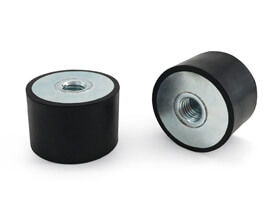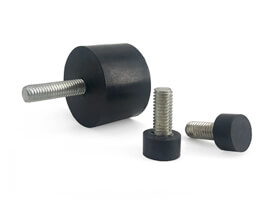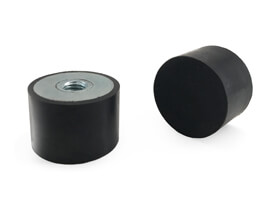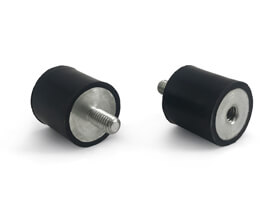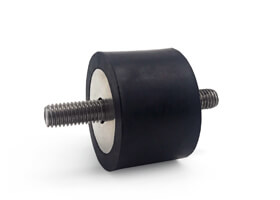Cylindrical Vibration Isolators
The first thing we need to know is that cylindrical vibration isolators are most commonly used in the engineering industry. They can be of different types. Today we have metal spring insulators, wire fiber insulators, rubber insulators, metal rubber insulators – as well as insulators that use hydraulic springs. Rubber cylindrical vibration isolators are the most common type – mostly used in combination with metal or steel. It is widely used in the field of vibration insulation of locomotives, ships, cars, airplanes, bridges, and musical instruments. These cylindrical vibration isolators use mainly an elastic component that dampens – and thus achieves a reduction in noise and loud and unpleasant vibrations. If the parameters of the rubber material and the damping structure are chosen reasonably – less vibration and noise insulation can be achieved.
As the most commonly used, cylindrical vibration isolators with rubber have several advantages. The model and structure itself are more elastic than metal. There is no sliding part, they are easy to maintain – and can be easily replaced if necessary. Installation is very simple. However, cylindrical vibration isolators have both advantages and disadvantages. Resistance to high, low temperatures and excessive contact with oil and oil has a worse effect on metallic materials. If used at temperatures that vary – they often wear out and vibration isolation is poorer, especially at low frequencies. But don’t let that confuse you because there are several types of cylindrical vibration isolators that have different purposes.
For example, the US industry was the first to produce and develop fiber isolators. Their noise-damping characteristics are related to deformation and they have good vibration characteristics – so they are highly rated. Such cylindrical vibration isolators absorb and dissipate vibration energy by dry friction by damping between the wires of wire ropes. Manufacturers have gradually recognized its advantages, and they have proven themselves in practical use in ships, in the aviation industry – as well as in many other industries.
Our Products
- Material: EPDM/NR/SBR/Silicone/FKM/NBR/CR
- Hardness: 30-90 Shore A
- Temperature Rang: -70℃ to 220℃, we can customize products with a temperature resistance of more than 300℃.
- Colors: Black,White Or according to the Pantone NO#.
- Custom service available, we can offer special rubber mounts according to your requirements.
Do you need a quote? Or need to place an order?
We also provide customized services, and can make various non-standard silicone rubber parts according to your drawings or samples.
Welcome to contact us for more information!
